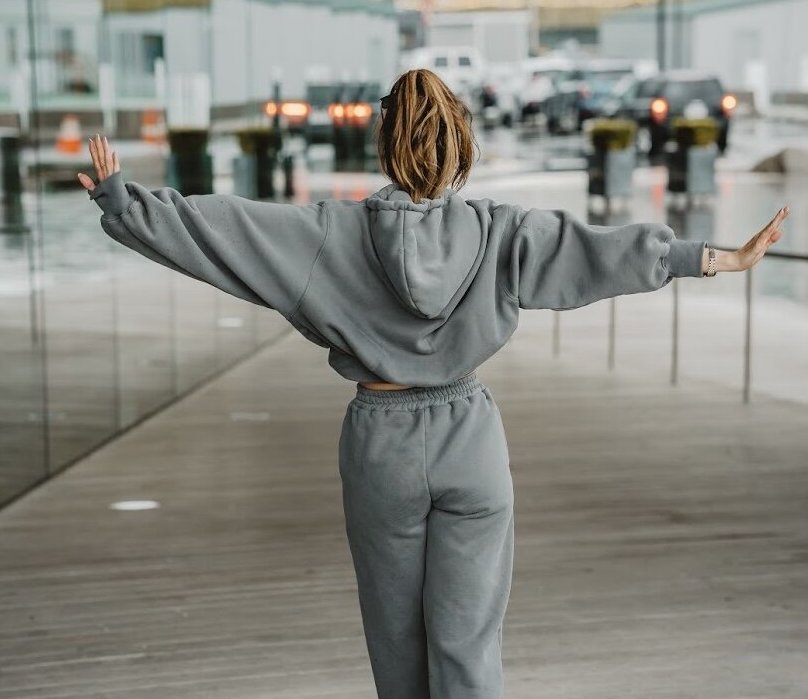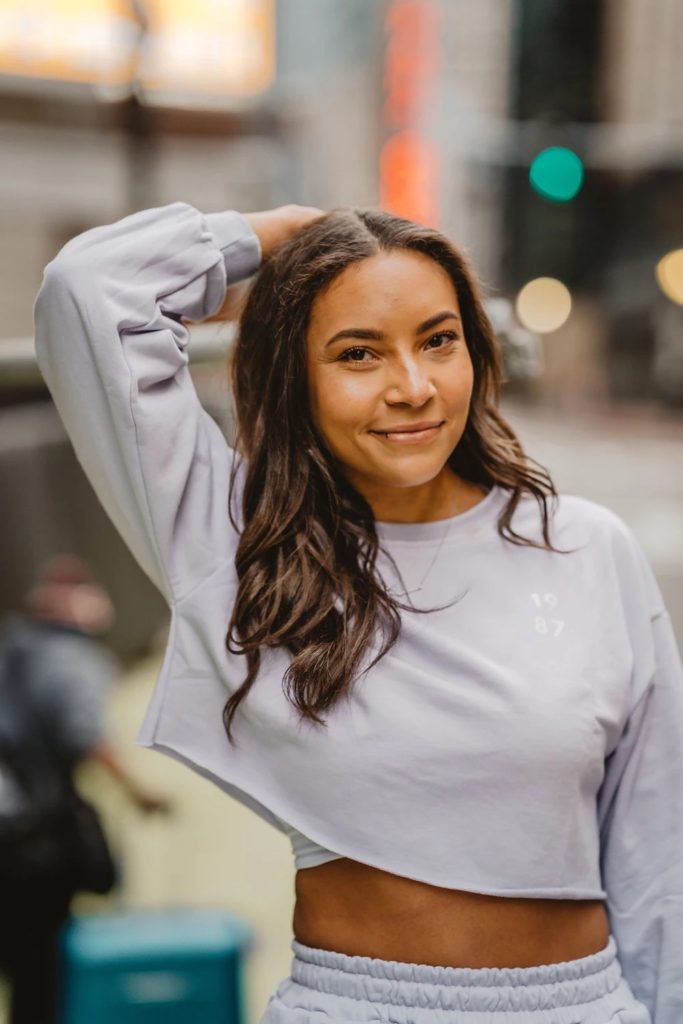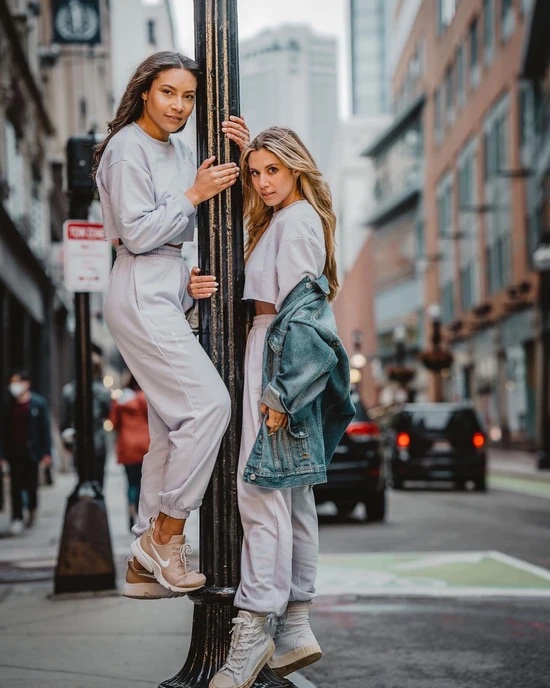Jennifer DeAngelis is the founder of 1987, an active loungewear company that draws inspiration from the city of Boston. We caught up with her to ask how she got started, how she’s so successful on social media, and her words of advice for others looking to build a brand. She also gave us an exclusive discount code for 15% your order at 1987, so read to the bottom to find that!
How would you describe your brand to someone who’s never heard of it in one sentence?
We’re a Boston-based Boston-inspired ultra hip loungewear company.

What led you to found 1987 loungewear?
I’ve always been entrepreneurial. I joke that I started my first company when I was five. It was called “Curly’s” and we sold exclusively curly fries — it was like a full restaurant in my basement. In my first real career, I was an intrapreneur which meant that I was building a digital division within an existing infrastructure. It was one of the top PR firms in the world. And so I worked across many Fortune 500s like Hilton Hotels, and Four Seasons. We did a lot of the first blogger and influencer campaigns and I did events like the Golden Globes. I understood the power of social media from a corporate side.
At that time people weren’t really sure of the purpose of Facebook – was it just to become friends or was there more to it? I learned so much and I’m really thankful for that time because when you work inside these amazing companies you see all different sorts of angles of the business and when you do social media you have to understand everything from marketing to funding and development to sales.
What I realized was I had knowledge gaps. At UCLA for undergrad, I studied political science. I thought I was going to do something completely different with my life, and so I had never taken a finance class or an operations class. I saw that as you build out a full division you need to forecast. You need to understand what your burn rate is. You need to understand how many new accounts you need to land in order to have hiring capacity, and all of that was just new to me.
I really wanted to go back to school and I thought for my purposes that a top 10 MBA school was the way to go just for the network alone. So, despite the odds, I ended up getting into the University of California Berkeley. I really never thought that that was going to happen because I think currently only 20% or 27% of each class is made up of a female demographic because well you know, there are a million reasons. It’s incredibly hard to get to these programs so I totally had imposter syndrome. I was like: “did they make a mistake, are you sure I’m meant to be here?” I remember just sitting down with some of the smartest people I’ve ever met and just feeling like, can I do this?
But long story short, I ended up loving Berkeley and they had a really strong entrepreneurship program so I came up with my first concept in business school which was an artificial intelligence application for matching brands and influencers at a dynamic price. I basically pitched the idea in a class and then we did a launch, which is an accelerator and one demo day and we got a grant from Berkeley. Then we went to a TechStars Blackstone program which is another accelerator, and I ended up full-blown building out a company and launching it out of grad school.
I would say COVID kind of saved me though because I was going up in front of venture capitalists, and I was being told things like “the way that you look is a problem” and “only 2% of VC funding goes to women.” You can kind of see why that is when you sit down with people. But it became clear to me that I wanted to run things on my own terms and not be beholden to the venture capitalists.
So when COVID happened, I was in a relationship, the world shut down and I just had time to reevaluate everything. I saw that I was in the wrong relationship for me, I was running the wrong company, and I didn’t love tech. I went into school really wanting to start a clothing company and I’ve loved clothes since I was younger.
I always tell people I’m not necessarily a person with the best style but I love clothes and I know what looks good. I know a good fit. So I think the initial premise was: “how do we create loungewear that doesn’t make you look like a potato?” We have loungewear that you can wear out to brunch and feel really cozy but also look super cool. And so that was kind of an initial idea and I remember sitting down with my dad and saying I really want to do this but I don’t know what people are gonna think. And he looked at me and said, “If you love clothing – if that’s what you want to do, do it, without caring what other people think. If you’re passionate about it and you love it, go do it!”
And so he gave me all the personal permission I needed and I was like alright let’s try it!
 Why did you go with the name 1987 for your brand?
Why did you go with the name 1987 for your brand?
This is so funny because when I talk with younger people they’re always like “it’s so retro” but that’s actually just the year that I was born. How the idea came about is you know when you go to fill out Google forms it will always autofill your name and your address and in company, for whatever reason, I would always pull up my birth date year and one time I was looking and I was like, actually, that’d be kind of a sick company name. But this was so many years before I actually decided to do it.
If you really, really love something it doesn’t feel like work, and it kind of flows out of you versus if I contrast that with my experience with the tech company I remember we spent like four months trying to name the company. So I think sometimes in life you have to trust your gut and when it’s right things start to fall into place in a way that’s almost inexplicable.
What was the building process of the brand?
I always say that everything that happened after that was like some type of magic. It was like I had had this idea in my head for a long time, and then we just hit the ground running and selling out from pretty much day one.
In entrepreneurship, there’s a lean startup methodology which is essentially that you should start with an MVP, which is a minimum viable product. The MVP for us was just a bra top and I decided to order a low quantity of these, to see if it had lift. The idea is that if you throw something on the market you don’t want to be spending years developing something only to find out that the market doesn’t really want it. In terms of clothing, you just want to create the smallest thing that you can create to show that there’s traction in the market or there’s a need for what you’re creating. So our MVP was a one-shoulder bra. I remember I uploaded a few TikToks; I think one of them was about dressing as different neighborhoods and another one was just about starting from a breakup to literally launching a clothing company out of my closet. That was the one that really started to pick up and I think we had like 80,000 views on it really quickly and the next thing I knew we had sold out of all the bras and I was like “wow okay, well we definitely have something on our hands!”
I think where everything changed was after I came up with this idea of 12 days of giveaways and I was running around the city hiding hoodies in different neighborhoods. I remember the first time I did it I was like I think this is a cool idea that’s going to have some lift on social media but maybe no one will even come. Like, who’s gonna leave their job to come find a hoodie? But I knew that we had to be creative. We didn’t have the same money that a large brand has to create a major holiday campaign. And so basically that series of 12 days, I think we hit a couple 100,000 views on the total aggregate view count across the campaign. People fell in love with what we were doing because we were also surprising moms at Boston Children’s Hospital and nurses on the cardiac floor at Mass General Hospital, so it was really a campaign about giving back even when it wasn’t easy for us to give back. It was something that I really care about, just in terms of life and what I’m trying to do here in being a role model and making sure that our company is responsible and doing things the best that we can, and giving back even when it’s not easy. I think that was something that people really identified with.
During that campaign, we got the most amazing messages. People would direct-message us and say, “you know COVID has been so hard and I’ve had lax motivation. Getting up and seeing your giveaways gives me something to wake up to and look forward to in the morning and a reason to get out of bed.” And the next thing we knew these packages were going in like five minutes. I think that was probably the moment that I realized something that we were doing was really working and that we had gone kind of from a passion project to an actual company.
What are the benefits for other businesses of really leaning into social media?
Especially for small businesses, social media is in so many ways the best thing that you can do because it’s free. It’s free marketing and it’s free advertising. We can’t go out and buy billboards or ad spots so social media gives us the opportunity to reach a lot of people for $0, which when you are a small business really matters.
My biggest piece of advice to anyone who is worrying about their social strategy is to really think about it from an entertainment and a content perspective. How can you get people excited to come and watch you? It’s almost like you’re creating a cheap television episode every single day on your stories. And I think not only is that a really unique way to connect with consumers, and also free, but it’s also more meaningful. We always talk about earned versus paid media– whenever you can get earned or organic hits that’s the type of customer that’s really going to love what you do.
I saw this huge opportunity with TikTok because TikTok is essentially still in an early adopter phase of the platform and basically what that means is the money vehicles behind it haven’t said okay now we’re prioritizing paid posts over organic posts which means that if you’re a small brand you have just as good a shot as like a Levi’s of getting views. You don’t need to pay for views because everything’s organic. The other advantage for TikTok is that it’s hyper-targeted so the people who are watching it are also people who live in a very close proximity, like a five-mile radius from where you’re at.
Since we’re Boston-based Boston-inspired all of our nomenclature and everything that is behind the brand has to do with Boston, like a set named after the Back Bay neighborhood or colors like “wicked” which is borrowed from vernacular around here. So, basically, the fact that we were Boston-based Boston-inspired meant that every time we uploaded a video we were hitting the people that are in our ideal initial market. It was one of the smartest things that we did early on.
I think so many of our sales are content-driven. As much as we are a high-quality producing clothing company we’re also a content provider. People always say, “I love watching your stories or I tune in every day.” Just the amount of DMs and views that we get on our stories is pretty impressive and I think it’s a new way of thinking about how a brand works.
 What would you say was the scariest thing about creating your own company?
What would you say was the scariest thing about creating your own company?
This was all self-funded so I always joke instead of buying a house I bought a company. But I remember the first time (not necessarily the first bras as I mentioned, because that was a really small buy), but the first time I did all the hoodies and joggers, just to pay that much money and be like, what if I sell nothing. I turned one of my closets into the inventory closet and I remember it was just filled to the brim and I was like, oh my god like this is actually a lot. I was terrified that no one was going to buy anything that we had and then I had this cool moment where I went to get the last hoodie (because I was doing all the packaging initially), and I just started hysterically crying because I could not believe I had actually sold everything in that closet!
What advice would you give to other entrepreneurs looking to take their own leap of faith?
I always say, “just start.” I think so often when people reach out to me for advice, they really want to do something and I’m like “Okay cool, well you should go start an MVP,” and they’re like “Oh, but I can’t until x happens.” And it can be the strangest things like, “I really need to move out of my apartment, or I really want to get engaged.” It’s things that are really not related at all. I think that is just fear-based reasoning because it’s really scary. It’s scary to know that you can go out, try something, and it might fail, and some people would rather never try, than try and fail.
I think the best piece of advice that I can give is to start small. Start with an MVP and pivot. If you put something out in the market, you might get a feedback loop that there’s a portion of your business that people are actually super excited about that you didn’t even think about. And so, it’s totally okay to pivot and iterate and every good entrepreneur I know has started multiple companies and it’s rarely the first idea out the gate that’s successful. I think that it’s okay to learn while you’re in the market that there’s this better opportunity and that’s not a failure. We always say in Silicon that failure is a good thing and that failing fast is a good thing.
How do you make sure to take care of yourself, while simultaneously growing a business?
I would say I’m very much working on that. One thing that I am good about is that I do work out every single day because I just think it helps my mental health more than anything. But I also think this is what I love to do so working really long days doesn’t really feel like it’s work in a way. The other part is that when you find something that doesn’t feel like work, that’s when you’re winning. But I’m the worst person to provide any sort of balance advice outside of working out every day and meditating every day!
What makes your brand different from other active loungewear on the market?
We talk a lot about democratizing the fashion process. So in a typical fashion scenario, if you think about the Gucci’s and Louis Vuitton’s of the world, they’ve always said, “We’re going to tell the populace what is cool,” whereas we have the inverse idea where we ask people to name our stuff, or what colors they want, or what types of fabrics they’re interested in or what they want the summer collection to look like. What that does is it creates a lot of buy-in for our community because they truly are in a weird way kind of our employees but also our customers.
Instead of sitting in a boardroom with five other executives trying to guess what people want, why wouldn’t you just go out and ask people on a simple poll or through Instagram stories? I think that’s such a unique thing that we do and I don’t see a lot of companies utilizing social media the way that we do.

Wow, what a vision and understanding of how to be successful! And she made it happen!!! 👏🏻👏🏻👏🏻